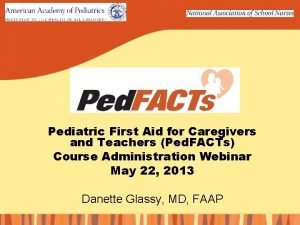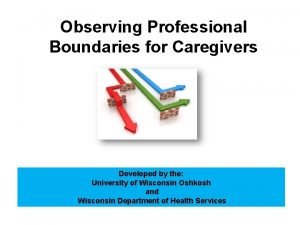Quality of Life in Caregivers of Individuals with


- Slides: 2

Quality of Life in Caregivers of Individuals with Dementia: The Impact of Communicative Breakdowns Brooke Thevenin B. S. / Kelly Rutherford M. S. , CCC-SLP / Alison Wilkinson / Justin Whittington Background Literary Analysis According to the Alzheimer’s Association, 15. 9 million family members and friends provided 18. 1 billion hours of unpaid care to individuals with Alzheimer’s disease and other dementia diagnoses in 2015 (2016). Caregivers and other loved ones play an invaluable role in the lives of individuals with dementia as their disease progresses and they become increasingly reliant on assistance to complete activities of daily living. As these individuals transition into the role of primary caregiver to their loved one, the developing difficulties with communication, memory, and cognition associated with dementia also take their toll. Difficulties with communication may lead to emerging communicative breakdowns between caregivers and individuals with dementia. This inability for one another to share and comprehend information correctly may influence caregiver quality of life. This study set out to examine the current literature of the field to identify quality of life considerations for caregivers of individuals with dementia. More specifically, researchers set out to investigate caregiver burden and quality of life associated with the impact of communicative breakdowns. Criterion established by the researchers identified 22 publications that were eligible for consideration. Research studies and other publications from a variety of journals initially indicated that the topic of communicative breakdowns for caregivers of individuals with dementia, as well as caregiver quality of life, were investigated across healthcare professions. Thematic analysis of the seven identified themes illustrated a relatively balanced distribution among the research. Research discussing caregiver burden and quality of life was most prevalent in literature selected for this study, followed by communication styles between caregiver and patient and symptoms of communicative breakdowns among individuals with dementia. Results of this analysis indicated that quality of life of caregivers of individuals with advanced dementia and the impact of communicative breakdowns are prevalent topics in professional literature, however caregivers and healthcare professionals are still facing difficulties mediating communication difficulties and burden associated with communicative breakdowns. Methods Implications and Future Researchers conducted a systematic analysis of literature from a variety of professional journals, including publications relevant to speech-language pathology, neurology, and nursing, in order to investigate the impact of communicative breakdowns on caregiver quality of life. Inclusionary and exclusionary criterion were established by the researchers. All journal publications utilized were peer-reviewed publications and published in English. Marshall University database searches were completed to identify publications that met established criterion. After initial evaluation of the literature, 22 publications were selected for further investigation. Researchers conducted a thematic analysis of literature related to overall quality of life of caregivers of individuals with dementia, as well as quality of life related to the impact of communicative breakdowns. Analysis revealed seven themes that were evident across the selected publications. These themes were relevant to caregiver quality of life and included elements of caregiver burden and quality of life, variations in communication styles, caregiver perceptions of communication abilities, and level of difficulty communicating with loved ones. Findings from this literary analysis identified gaps in literature publications and current practices regarding mediation of communicative breakdowns and further recommendations for caregivers of individuals with dementia diagnoses facing quality of life issues. As professionals who interact with these patients and their caregivers, we have a role in counseling, providing mediation strategies, and offering support to caregivers who experience difficulties with communicative breakdowns. With these findings, members of this research team plan to establish and administer a survey to caregivers of individuals with dementia to evaluate several factors. Survey content will focus on caregiver quality of life, the caregiver’s perceived burden associated with assuming primary caregiver responsibilities, and the caregiver’s experiences with communicative breakdowns in their daily interactions with their loved one. Results from this literary analysis, along with data collected from survey responses, will be utilized to improve patient and caregiver education for individuals with dementia and professional support and counseling services for caregivers of individuals with dementia Special Recognition: The authors of this study would like to recognize and thank the Marshall University Department of Communication Disorders faculty for their mentorship and continued support throughout this research study. Themes Prevalent Within the Literature Seven themes were consistently identified within relevant publications. They included: 1. Caregiver burden and quality of life 2. Cognitive/functional abilities causing problem behaviors 3. Caregiver perception of communication abilities 4. Communication breakdown symptoms in dementia patients 5. Communication style between caregiver and patient 6. Demographics of caregiver 7. Patient education West Virginia Speech-Language-Hearing Association Bridgeport, West Virginia 2017 Convention Disclosures: The authors of this study have no financial relationships to disclose. References: Please separate reference page for complete list of sources used for this literature review.

References Abdollahpour, I. , Nedjat, S. , Salimi, Y. , Noroozian, M. , & Majdzadeh, R. (2015). Which variable is the strongest adjusted predictor of quality of life in caregivers of patients with dementia? Psychogeriatrics, 15(1), 51 -57. Alvira, M. C. , Risco, E. , Cabrera, E. , Farre, M. , Rahm Hallberg, I. , Bleijlevens, M. H. , &. . . Zabalegui, A. (2015). The association between positive-negative reactions of informal caregivers of people with dementia and health outcomes in eight European countries: a cross-sectional study. Journal Of Advanced Nursing, 71(6), 1417 -1434. Arlt, S. , Hornung, J. , Eichenlaub, M. , Jahn, H. , Bullinger, M. , & Petersen, C. (2008). The patient with dementia, the caregiver and the doctor: cognition, depression and quality of life from three perspectives. International Journal Of Geriatric Psychiatry, 23(6), 604 -610. Byrne, K. & Orange, J. B. (2005). Conceptualizing communication enhancement in dementia for family caregivers using the WHO-ICF framework. Advances in Speech-Language Pathology, 7(4), 187 -202. Donkin, H. B. (2009). Family caregivers of people with dementia. Dialogues in Clinical Neuroscience, 11(2), 217 -228. Egan, M. , Bérubé, D. , Racine, G. , Leonard, C. , & Rochon, E. (2010). Methods to enhance verbal communication between individuals with Alzheimer's disease and their formal and informal caregivers: A systematic review. International Journal of Alzheimer's Disease, 2010. Götell, E. , Brown, S. , & Ekman, S. (2009). The influence of caregiver singing and background music on vocally expressed emotions and moods in dementia care. International Journal of Nursing Studies, 46(4), 422 -430. Haberstroh, J. , Neumeyer, K. , Krause, K. , Franzmann, J. , & Pantel, J. (2011). TANDEM: Communication training for informal caregivers of people with dementia. Aging & Mental Health, 15(3), 405 -413. Hammar, L. M. , Emami, A. , Engström, G. , & Götell, E. (2011). Communicating through caregiver singing during morning care situations in dementia care. Scandinavian Journal of Caring Sciences, 25(1), 160 -168. Hammar, L. M. , Emami, A. , Götell, E. , & Engström, G. (2011). The impact of caregivers' singing on expressions of emotion and resistance during morning care situations in persons with dementia: an intervention in dementia care. Journal of Clinical Nursing, 20(7/8), 969 -978. Huang, H-L. , Chang, M. Y. , Tang, J. S-H. , Chiu, Y-C. , & Weng, L-C. (2008). Determinants of thediscrepancy in patient- and caregiver-rated quality of life for persons with dementia. Journal of Clinical Nursing, 18(22), 31073117. Jing-Jy, W. , Feldt, K. , & Wen-Yun, C. (2012). Characteristics and underlying meaning of hoarding behavior in elders with alzheimer's dementia: caregivers' perspective. Journal of Nursing Research, 20(3), 189 -196. Lepp, M. , Ringsberg, K. C. , Holm, A. , & Sellersjö, G. (2003). Dementia -- involving patients and their caregivers in a drama programme: the caregivers' experiences. Journal of Clinical Nursing, 12(6), 873 -881. Powell, J. A. , Hale, M. A. , & Bayer, A. J. (1995). Symptoms of communication breakdown in dementia: Carers’ perceptions. European Journal of Disorders of Communication, 30(1), 65 -75. Saunders, P. A. , Ruth, J. , Latella, L. , & Talisman, N. (2016). Communicative coping behavior checklist: Observation of persons with dementia in the home environment. Gerontologist, 56(4), 63 -69. Savundranayagam, M. Y. , Hummert, M. L. , and Montgomery, R. J. V. (2005). Investigating the effects of communication problems on caregiver burden. Journal of Gerontology, 60 B(1), S 48 -S 55. Shaw, W. S. , Patterson, T. L. , Semple, S. J. , Ho, S. , Irwin, M. R. , Hauger, R. L. , & Grant, I. (1997). Longitudinal analysis of multiple indicators of health decline among spousal caregivers. Annals of Behavioral Medicine, 19(2), 101 -109. Small, J. A. , Geldart, K. , & Gutman, G. (2000). Communication between individuals with dementia and their caregivers during activities of daily living. American Journal of Alzheimer’s Disease & Other Dementias, 15(5), 291 - 302. Small, J. A. & Perry, J. (2005). Do you remember? How caregivers question their spouses who have Alzheimer’s Disease and the impact on communication. Journal of Speech, Language, and Hearing Research, 48, 125 -136. Small, J. A. , Perry, J. , & Lewis, J. (2005). Perceptions of family caregivers’ psychosocial behaviors when communicating with spouses who have Alzheimer’s disease. American Journal of Alzheimer’s Disease and Other Dementias, 20(5), 281 - 289. Thomas, C. C. , Wallace, L. , Alexander, J. , & Vijayan, A. (2015). The relationship between the use of adult dementia day carer and caregiver quality of life. Perspectives on Gerontology, 20, 104 -115. Thomas, P. , Lalloué, F. , Preux, P. , Hazif-Thomas, C. , Pariel, S. , Inscale, R. , &. . . Clément, J. (2006). Dementia patients caregivers quality of life: the PIXEL study. International Journal of Geriatric Psychiatry, 21(1), 50 -56. Zientz, J. , Rackley, A. , Chapman, S. B. , Hopper, T. , Mahendra, N. , Kim, E. S. , & Cleary, S. (2007). Evidence-based practice recommendations for dementia: Educating caregivers on Alzheimer’s disease and training communication strategies. Journal of Medical Speech-Language Pathology, 15(1), 3 -14.



